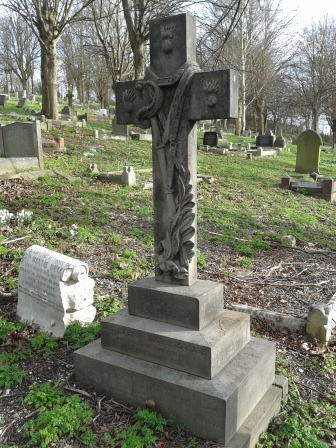Digest of stories from the Beds & Herts Saturday Telegraph: August 10th, 1918.
A most impressive military funeral took place at Luton on Thursday afternoon, when a magnificent tribute was paid by the Royal Field Artillery and the Honourable Artillery Company to the memory of the late Lieut Harold Victor (Harry) Ramsey.
 Lieut 'Blackie' Ramsey died at Wardown Hospital on Monday at the age of 38 years. He was taken to Wardown Hospital nearly a fortnight ago suffering from pneumonia, but despite the great care and attention given to him he passed away on Monday.
Lieut 'Blackie' Ramsey died at Wardown Hospital on Monday at the age of 38 years. He was taken to Wardown Hospital nearly a fortnight ago suffering from pneumonia, but despite the great care and attention given to him he passed away on Monday.
He was a valuable officer in the riding school at Biscot and was unmarried.
For the impressive ceremony on Thursday there was a great parade of officers and men, and people lined the streets from Wardown Hospital to the Church Cemetery. The coffin, covered with the Union Jack, was placed on a gun carriage drawn by a team of fine black horses. On the coffin was placed the deceased soldier's cap, sword, belt and revolver.
Lieut Ramsey's horse followed, the officer's boots and spurs being reversed. The procession was led by the band of the Middlesex Regiment, playing stirring funeral music, and the firing party and trumpeters followed. The chief mourners were the deceased's three elder brothers.
[Pictured right: Lieut Ramsey's gravestone at the Luton Church Cemetery, Crawley Green Road.]
-
The death has occurred under tragic circumstances of Regimental Sgt-Major Ronald William Wilkins (Lincolnshire Regiment), late of St Albans and now of Bournemouth. After serving in France and Ireland with the Lincolns, he was sent to Salisbury Plain, where a week last Sunday afternoon he was cycling with two other sergeant-majors when he was over come by the heat and dropped dead off his machine. Sgt-Major Wilkins had fought in the South African War and joined the Cape Mounted Police, remaining in South Africa for eight years. On his return to England he found employment with Commercial Cars Ltd at Luton, with whom he became assistant export manager. A verdict of death from heart failure was returned at an inquest. The funeral took place at Bournemouth with full military honours.
-
Saturday, August 31, will be the occasion of a unique display in Luton, the novelty of which should constitute quite a treat for townspeople. It swill take the form of a military tournament which is being arranged by permission of the Brigade Commander of the 6gth Reserve Brigade R.F.A., Biscot, in aid of the Wardown and Bute Hospitals, the Blue Cross Society and the R.F.A. Prisoners of War Fund. The Town football ground has been kindly lent by the directors, and there should be crowds present to witness what is a novelty in this district – military mounted sports.
-
Half the town seems to have gone away for the annual vacation. The majority have gone to the South Coast, but a considerable number of the new residents of Luton have returned home to compared notes and possibly bring back other members of the family to this lucrative locality. Some of them have lost no time in being persuaded, judging by the number of applications at the Luton Food Office for “visitors' forms,” for yesterday we saw the last one handed over the counter, and it was estimated that a thousand had been handed out this week.
-
It is somewhat surprising that members of the Council raise so little protest about the condition of the tram track. In Dunstable Road it is really in a very bad state, and frequently the cause of minor mishaps to vehicular traffic and cyclists. We are aware there is a war on, but unless something is speedily done there may be more serious consequences.
-
The minister of a Luton church showed pleasing thoughtfulness on Sunday morning at a service in connection with the fourth anniversary of the outbreak of war. A large body of soldiers officially attended, and before the sermon the minister announced that as the men had been on duty since 6.30 the congregation would sit to sing the next hymn. He was sure the boys in khaki would appreciate this.
-
Fruit stones and nut shells are urgently needed during the next two or three months for conversion into charcoal for use in anti-gas masks. The charcoal thus produced greatly increases our soldiers' chances of coming safely through gas attacks. Collections of these materials are being organised.

